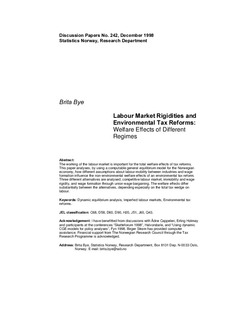Labour market rigidities and environmental tax reforms : welfare effects of different regimes
Working paper

Åpne
Permanent lenke
http://hdl.handle.net/11250/180735Utgivelsesdato
1998Metadata
Vis full innførselSamlinger
- Discussion Papers [1003]
Sammendrag
The working of the labour market is important for the total welfare effects of tax reforms. This paper analyses, by using a computable general equilibrium model for the Norwegian economy, how different assumptions about labour mobility between industries and wage formation influence the non-environmental welfare effects of an environmental tax reform. Three different alternatives are analysed; competitive labour market, immobility and wage rigidity, and wage formation through union wage bargaining. The welfare effects differ substantially between the alternatives, depending especially on the total tax wedge on labour.
Keywords: Dynamic equilibrium analysis, Imperfect labour markets, Environmental tax reforms
Utgiver
Statistics Norway, Research DepartmentSerie
Discussion Papers;No. 242Beslektede innførsler
Viser innførsler beslektet ved tittel, forfatter og emneord.
-
The impacts of alternative policy instruments on environmental performance. A firm level study of temporary and persistent effects
Bye, Brita; Klemetsen, Marit Elisabeth (Discussion papers;788, Working paper, 2014-10)We study the effects of various environmental regulations on environmental performance measured as emission intensity. Moreover, we aim to test whether any such effects are persistent or only temporary. Conventional theory ... -
The welfare effects of carbon policies: grandfathered quotas versus differentiated taxes
Bye, Brita; Nyborg, Karine (Discussion Papers;No. 261, Working paper, 1999)Recently, it has been demonstrated that pre-existing distortionary taxes can substantially increase the costs of market-based instruments which do not raise revenue, such as non-auctioned emissions quotas. Revenue-raising ... -
Consequences of the IPPC-directive’s BAT requirements for abatement costs and emissions
Larsson, Jan; Telle, Kjetil (Discussion Papers;No. 411, Working paper, 2005)Abstract: The Integration Pollution and Prevention Control (IPPC) directive from the European Union implies that the regulatory emission caps should be set in accordance with each industry’s Best Available Techniques ...